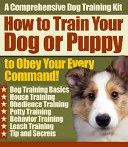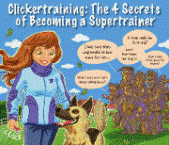Good Dog Training Advice
Get Fast & Simple Dog Training Tips to
Turn a Difficult Dog Into an Obedient Pet!
Obsessive Compulsive Disorders in Dogs
Many people assume that common psychological issues that humans have won't show up in their furry friends. But, if you've ever met a dog that obsesses over every little thing they encounter, you know that dogs can suffer from obsessive compulsive disorder. In the end, it comes down to how you treat your dog's compulsions and what they come to expect around the house. What Is Obsessive Compulsive Disorder? Obsessive compulsive disorder is something you'll often see in dogs that are anxious, bored or stressed out. It is generally diagnosed by obsessive, focused actions repeated over and over again for no apparent reason. For example, a dog that digs countless holes for hours, or chews through chew toys, or licks himself raw when he has an itch - these are all examples of how OCD can manifest in your pet. The problem with OCD, beyond the obvious possible health issues that it can cause are many. A dog with OCD might destroy property, be loud and obnoxious, or become aggressive in strange and unpredictable ways. If your dog's OCD is caused by stress, you will likely need to see a veterinarian. Dealing with stress in an animal can be hard to do and can lead to dangerous behaviours in your dog. You may need to rely on medication to handle these issues. Dealing with Boredom If your dog's OCD is caused by boredom, there are many things you can do to reduce that boredom. Step one is to bump up the activity level of your dog. He may just not be getting enough time outside - something that can lead to health problems as well if you're not careful. Get outside, play fetch, take long walks, run around the yard, or take your dog to a doggy daycare where he will get a lot of exercise. The more energy you expend from your pet in controlled, healthy ways, the less energy he will turn on your prized possessions. Separation Anxiety The other common cause of OCD in dogs is dog separation anxiety. A dog that is too long separated from his family and whose behaviour is supported in specific ways will start to channel that anxiety in ways that can be very destructive. If your dog tends to show these compulsions most when you're not home, it is likely because they are feeling anxious about you being gone. Solving anxiety issues is a long process, but it starts with asserting your position as the pack leader of your household. Once you've set yourself up as the pack leader, you can focus on reducing your dog's anxiety when you leave. Do this by ignoring them when you return home, and by providing a safe space for them to sleep, such as in a crate. Possible Genetic Link And, while there are some arguments about the role of the dog's breed in OCD behaviours, it has been noted that some breeds just have more compulsive behaviours than others. Dobermans will lick their skin, shepherds chase their tails, bull terriers will stick their heads under objects. In most cases, however, if you provide the necessary exercise and attention, don't instil anxiety laden behaviours in your dog when you leave and return home, and see your vet when all else fails, you should be able to control or eliminate these OCD issues. For the most comprehensive guide to dog health that I've seen online, go check out The Ultimate Guide to Dog Health at: ==> http://gooddogtrainingadvice.com/doghealth.html
| |
|


Discover the Secrets to Training Your Dog Or Puppy. Huge BONUSES for a limited time only!
Click here now...
|
http://GoodDogTrainingAdvice.com






